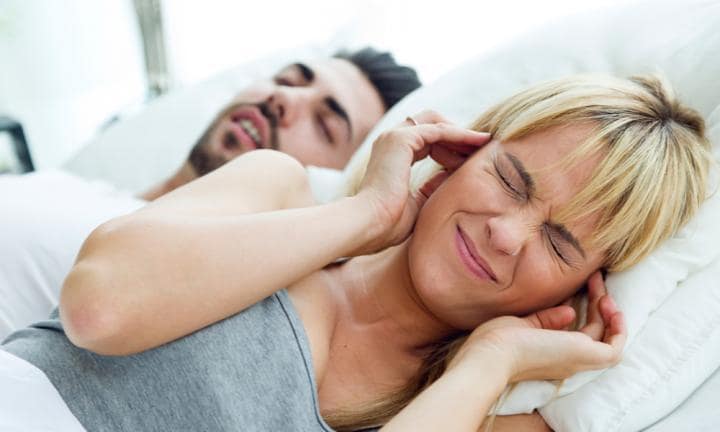Snoring / Sleep Apnea — Overview
If you have sleep apnea, you could stop breathing hundreds of times per night, every night. Each apnea may sound like loud snoring to a partner or like you’re waking up gasping for air. Those with sleep apnea often don’t remember that it happens.
Click Now for Your FREE Snoring and Sleep Apnea Consultation

Symptoms and Dangers of Sleep Apnea
Every person needs oxygen. We can last a few weeks without food and several days without water, but what about air? We can only last a few minutes at the most. So, sleep apnea oxygen deprivation is a serious risk!
Sleep apnea can lead to:
- Daytime Drowsiness: Because sleep apnea makes a person stop breathing during sleep, interrupting sleep cycles hundreds of times per night, he or she cannot achieve full rest. This can lead to involuntary sleep while driving or operating other machinery.
- Headaches and Other Pains: Sufferers can frequently wake with sleep apnea headaches. They may also have unexplained sleep apnea fatigue throughout the day, along with trembling muscles.
- Type 2 Diabetes: According to research, it’s possible that sleep apnea causes diabetes in some people. This is likely because sleep deprivation disrupts insulin production and production of hormones that signal when someone is full.
- Heart Problems: Repeated oxygen deprivation causes intense stress to the heart and blood vessels. It can lead to abnormal heartbeats, heart attacks, high blood pressure, and even death, if a sufferer already has heart disease.
- Liver Disease: Studies have connected sleep apnea with liver scarring and function problems.
- Metabolic Syndrome: This is a mix of problems that can include cholesterol issues, high blood sugar and pressure, and abdominal obesity. It can lead to heart attack and/or stroke.
- Adverse Reactions to Treatments: Sufferers can experience dangerous reactions to anesthesia, other medications, and surgery.
- Poor Mental Performance: Memory, concentration, creativity, and decision making capabilities can all decline.
- Mood Problems: Sudden changes in mood can develop, along with irritability. Sleep apnea and depression are also connected for some.
- Increased Weight: Fatigue and hormone imbalances brought on by sleep deprivation can also cause weight gain. Snoring and weight are also linked, because being overweight can obstruct the airway.
- Loud Snoring: Each apnea may take the form of loud snores. A spouse, partner, and/or children may also become sleep deprived as a result.
If you are experiencing one of these sleep apnea side effects or several of them, call our office today! You can also take our online sleep apnea quiz to get even more insight—although you won’t know for sure if you have sleep apnea until you receive a medical diagnosis.
Click Now for Your FREE Snoring and Sleep Apnea Consultation
How to Get Diagnosed With Sleep Apnea

To find out for sure, you could:
- Go to a Sleep Disorder Center: Your vital data will be carefully monitored and recorded. This can include arm and leg movements, oxygen levels, brain activity, breathing rates, and more.
- Engage in a Home Sleep Study: A simplified home sleep apnea test machine can detect if your heart rate, oxygen levels, and breathing suddenly shift during the night.
Your diagnosis could be for central sleep apnea, in which the brain signal to breath is interrupted. But obstructive sleep apnea, in which an obstruction slows down or blocks airflow, is much more common. It’s also possible to have a combination of both conditions.
Visit Sleep Better Illinois for a FREE Sleep Apnea Consultation
If you have sleep apnea symptoms, please call your sleep dentistry specialists at Sleep Better Illinois. Remember, sleep apnea can lead to serious problems, such as falling asleep while driving or chronic diseases, so don’t put this off.
Oral devices are covered by medical insurance, including Medicare, and insurance can help to pay for a sleep apnea study either in a lab or at home. They may also help you purchase a sleep apnea mouthpiece to correct it. Just imagine waking up feeling refreshed every morning and enjoying more activities in your day.
Call sleep apnea dentist Dr. Stirneman now to move toward your goals with a recognized leader in the field on your side.
Click Now for Your FREE Snoring and Sleep Apnea Consultation